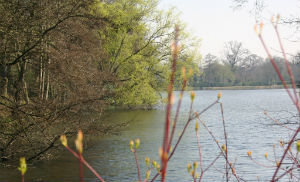University experts helping UK government improve water quality
31 March 2017

Experts from the University of Reading are working with government to reduce pollution in UK rivers, lakes and wetlands and improve ecosystems.
They have contributed to creating a new Catchment Management and Modelling Platform (CaMMP), which brings together more than 100 publicly available online datasets, and the most commonly used simulation models for improving water quality in the UK, in one convenient place. It was launched at an event hosted by the Department for the Environment, Food and Rural Affairs (DEFRA) in London on 9 March.
The project is led by the Centre for Ecology & Hydrology (CEH) and will benefit government, public agencies, water companies and conservation organisations who manage water quality in catchments and nationally. It could also be used to determine ways to reduce the impact of food production on the environment, whilst simultaneously improving wildlife habitats and reducing greenhouse gases.
The University of Reading was a core partner, and its scientists helped design the online platform as well as providing case studies which demonstrate how effective various techniques have been in the past to solve water quality problems.
Professor Andrew Wade, from the University of Reading’s Geography and Environmental Science department, said: “Those who manage our landscape and water resources are aiming to improve the quality of our rivers, lakes and wetlands.
“For this task they simultaneously have to consider multiple pollutants, multiple environmental policies and guidelines, and also think how changes to the landscape will affect not only the water quality but other ecosystem services such as flood mitigation, habitat protection and carbon accumulation and loss.
“This is a very complex problem and this online resource is designed to help provide better access to the data and tools to do the job.”
Data can be hard to track down
The launch event was attended by the representatives of a range of organisations including the Environment Agency, water utility companies, university and research organisations and the government departments of Wales and Northern Ireland.
Presentations were given on the benefits of the system, including ways of managing multiple pollutants, robustness of management solutions in the face of climate change and how management solutions could be applied further afield.
Users of the CaMMP platform can sift for data that is relevant to them, searching for data on issues by topic, data type and scale. One example of its use would be finding out the effectiveness of offering financial incentives to farmers to avoid harmful chemicals like metaldehyde, thereby further enhancing drinking water quality and reducing operating costs.
Professor Jack Cosby, who specialises in integrated catchment management and soil systems at the CEH, said: “All the data and modelling resources on the CaMMP Platform are freely available but are hard to track down for many organisations and not always well described.
“By bringing them together in one place and demonstrating how they can be used to answer a set of key issues, CaMMP provides practical support for a wide range of organisations involved in catchment management from local to national scale.”
For more information on the CaMMP project, visit: www.cammp.org.uk.
